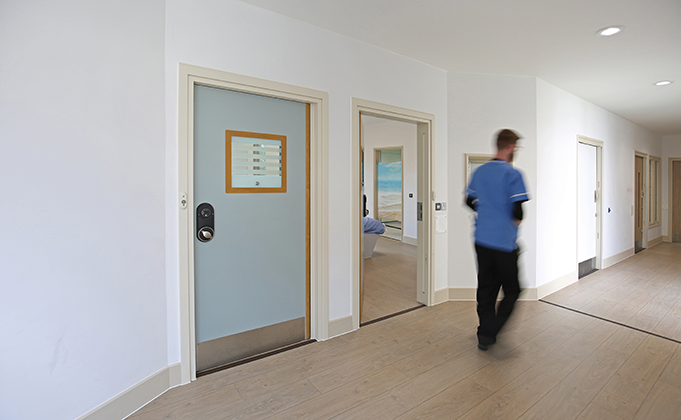
Designing Mental Health Facilities: The Crucial Role of Anti-Ligature Compliance
7th August 2024
In the field of mental health care, treatment facility design is critical to patient well-being and recovery. However, a recent report authored by Dr. Susan Finnerty reveals a concerning reality: many mental health units in Ireland do not meet the standards required to provide optimal care. The report, titled ‘Physical Environments in Mental Health Inpatient Units,’ examines the numerous challenges posed by existing infrastructures, emphasizing the critical need for anti-ligature compliance in mental health facility design.

Understanding the Problem
The statistics provided in the report paint a stark picture of non-compliance within mental health units. Over recent years, a significant percentage of centres have failed to meet regulatory standards for premises, with issues ranging from cleanliness and maintenance to fundamental design flaws. Notably, a recurring issue identified in the report is the presence of ligature anchor points, among other structural inadequacies like poor ventilation and unsuitable furniture.
Impact on Patient Care
Dr. Finnerty emphasizes that these design deficiencies directly impact patient experiences and outcomes. Inadequate facilities can exacerbate stress levels among patients, potentially escalating aggressive behaviour—an ongoing concern in psychiatric facilities globally. The report underscores the importance of moving beyond traditional security-focused designs towards environments that prioritize patient well-being and recovery.
The Role of Anti-Ligature Compliance
Among the various design considerations, anti-ligature compliance emerges as a critical aspect. Ligature points, such as protruding hooks or fixtures, pose serious risks for self-harm and accidental injury. The presence of such hazards not only compromises patient safety but also hampers efforts to create therapeutic and supportive environments essential for mental health care.
Design Interventions for Improved Care
The report highlights several design interventions that can significantly enhance the quality of mental health facilities:
- Single En Suite Bedrooms: Providing private spaces with attached bathrooms fosters privacy, reduces social density stress, and supports individualized care.
- Communal Spaces: Well-designed communal areas offer patients opportunities for social interaction, relaxation, and therapeutic activities, contributing to a positive healing environment.
- Outdoor Access: Accessible outdoor areas promote physical activity, exposure to natural light, and a connection to nature, all of which are beneficial for mental well-being.
- Anti-Ligature Fixtures: Incorporating fixtures and fittings that are anti-ligature, robust, and resistant to tampering, such as anti-ligature doorsets and anti-ligature hardware & accessories, ensures a safer environment for patients and staff alike.

Addressing Current Challenges
While newer facilities showcase compliance and improved design standards, the pressing challenge lies in upgrading existing structures. Dr. Finnerty stresses the need for substantial funding to replace or renovate unsuitable buildings, aligning them with modern care standards. Ultimately, the report advocates for a holistic approach to mental health facility design—one that prioritizes patient safety, privacy, and dignity while fostering therapeutic environments conducive to recovery. Engaging service users in the design process and maintaining high standards of cleanliness and maintenance are also highlighted as crucial elements in delivering effective and compassionate mental health care.
As we navigate the complexities of mental health care, the importance of anti-ligature compliance in facility design cannot be overstated. It is not merely a matter of meeting regulatory requirements but a fundamental step towards ensuring the well-being and dignity of those receiving mental health services. By investing in thoughtful and compliant designs, we pave the way for a more compassionate and effective mental health care landscape—one that values every individual’s right to safe and dignified treatment environments.